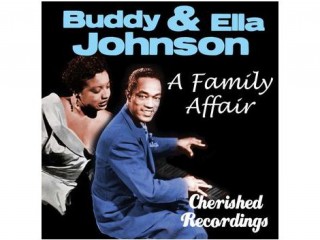
Ella Johnson biography
Date of birth : 1919-06-22
Date of death : 2004-02-16
Birthplace : Darlington, South Carolina, U.S.
Nationality : American
Category : Famous Figures
Last modified : 2011-12-05
Credited as : blues singer, jazz musician, Buddy Johnson
0 votes so far
Working with Buddy Johnson and His Orchestra from the 1940s to the 1960s, Ella had numerous hit singles including "Please, Mr. Johnson," "Did You See Jackie Robinson Hit That Ball?," and the jazz standard "Since I Fell for You." Although she never received the popular acclaim of such singing legends as Billie Holiday or Ella Fitzgerald, many critics have praised her as one of the significant artists of rhythm and blues.
Johnson was born into a large family in Darlington, South Carolina. While some sources list her birth year as 1923, most cite 1917. Like her older brother Buddy, Ella had an early interest in music. By 1939, Buddy, who had left South Carolina for New York City, had made his first record for Decca, a major label that handled popular artists of the 1930s and 1940s including Bing Crosby, Louis Armstrong, and the Andrews Sisters. Buddy's first single, "Stop Pretending (So Hep You See)," was a success. While still a teenager, Ella followed her brother's footsteps to New York City, where Buddy immediately found a place for her in his band, which also included singers Arthur Prysock, Nolan Lewis, and Floyd Ryland.
Buddy Johnson and His Orchestra became a mainstay act in New York City, where they regularly performed at Harlem's Savoy Ballroom, and they also became a popular national touring band. Ella earned praise for her ability to sing uptempo, jazzy blues tunes called "jump blues" as well as luscious ballads. In 1940 she recorded her first hit single with "Please, Mr. Johnson," a song written by Buddy. With this hit, Ella stood out among the numerous female vocalists of the era.
Johnson continued to perform and record with her brother's band throughout World War II, singing lead vocals on many of the band's biggest hits, such as R&B chart toppers "When My Man Comes Home" and "That's the Stuff You Gotta Watch." Her most enduring song, "Since I Fell for You," was released in 1945 and has become a jazz standard performed by numerous artists, among them Lenny Welch, who launched his career with the ballad in 1963.
Ella and her brother recorded numerous jump blues and rhythm and blues classics on the Decca label from 1941 to 1952. Many of her songs were originally released as singles, and it wasn't until 1956 that they were recorded on the compilation album Swing Me. The Decca recordings have been recognized as significant works that bridged the gap between rhythm and blues and rock and roll.
Buddy and Ella moved to Mercury Records in 1953, where Ella maintained her spot as the sassy and sultry vocalist with her brother's band. At this stage in their careers, they had to compete with the rising popularity of rock and roll and adjust to styles that appealed to radio audiences. Tony Russell commented in the London Guardian that Buddy "had a rare skill of adapting to changing styles and made a number of rock 'n' roll-oriented recordings that were quite well received .... Ella showed some of the same versatility, and had a further chart entry in 1956 with 'I Don't Want Nobody.'" It was their nonstop touring, however, that kept the band fresh.
By the 1960s, the era of the big band became overshadowed by the popularity of rock and roll, and the Johnsons could no longer book shows on the dancehall circuit because that venue was disappearing. Buddy broke up the band, and with this move Ella's singing career effectively ended. Many have speculated why Ella Johnson never achieved the celebrity status of other female singers of her time period. Some critics have felt that she may not have had the confidence to perform without Buddy. And Steve Cushing, host of the syndicated radio program Blues before Sunrise, remarked on his website that during its time, Buddy Johnson's and Ella's following "was almost exclusively black." Regardless of the reasons, Ella was loyal to Buddy and remained a vibrant part of the band throughout her career.
Following her retirement Ella lived in Harlem, remaining close to Buddy as he battled the disease of cancer. David Greenberger, a commentator for the National Public Radio (NPR) program All Things Considered, noted that Buddy "anchored Ella financially and emotionally." After Buddy died in 1977 from cancer, Ella lost a legal battle over her brother's copyrighted material and gained very little from his estate. And a short time later, her only son became the victim of murder. Ella's condition declined in her later years as her memory lapsed. Despite fading from the public eye, her work was not forgotten. In 1992 the Rhythm & Blues Foundation honored Ella with a Pioneer Award and $15,000, in recognition of her singing career during the 1940s.
Ella Johnson died in February of 2004, but her legacy has remained vital. Following her death, David Hinkley noted in the New York Daily News that she "represented a kind of singer who is especially overlooked: The women who came out of the big bands, swing and the blues, and put it all together into a marvelously distinctive style that built bridges from big bands to combos, from jazz to R&B, and eventually to rock 'n' roll." Even though four decades elapsed between Ella Johnson's last public performances and her death, audiences did not forget her. In his appreciation of Johnson, Greenberger described her unique talent: "Direct and intimate, her voice has an immediacy and ease that sounds fresh whenever I hear her. It makes me feel good to hear Ella Johnson sing. Music like hers should not be a secret. The time is as right as it always is for Ella Johnson's voice to connect with new listeners."
















